Mercedes-Benz E Class E300 e (2024) review: luxury tech on wheels
The Mercedes-Benz[1] E-Class has been the choice of the executive driver since the early 90s, and its mid-size saloon form dates back much further. It’s a car that represents luxury, without the opulence and grandiose of the S-Class. A car that has been the choice of company CEOs, executive limos and middle-class family cars, and it just got an upgrade.
The 2024 Mercedes E-Class is the car's sixth generation and represents a new W214 body type in the range. Both inside and outside, the design moves the car closer than ever to the all-electric EQ models, with a slicker grill and a truly tech-focused dash. After all, with the company planning to only sell electric models[2] by 2030, this could be the last E-Class model with a combustion engine.
In truth, none of the 16 new engine variants of the Mercedes-Benz E-Class are pure combustion any more. Most feature a mild hybrid arrangement, with a 17kW battery that boosts both power and economy by transferring energy back to the battery when braking. There is also the option of a plug-in hybrid (PHEV), which features a larger 95kW battery, extending the pure electric driving range and massively reducing that consumption figure.
I believe that the PHEV model, the Mercedes E300 e, is the most interesting choice in the lineup, and it’s the one I got the chance to drive. In short, this model has the potential to be one of the best Mercedes models on the market, though currently misses a few EQ features that would make it perfect.
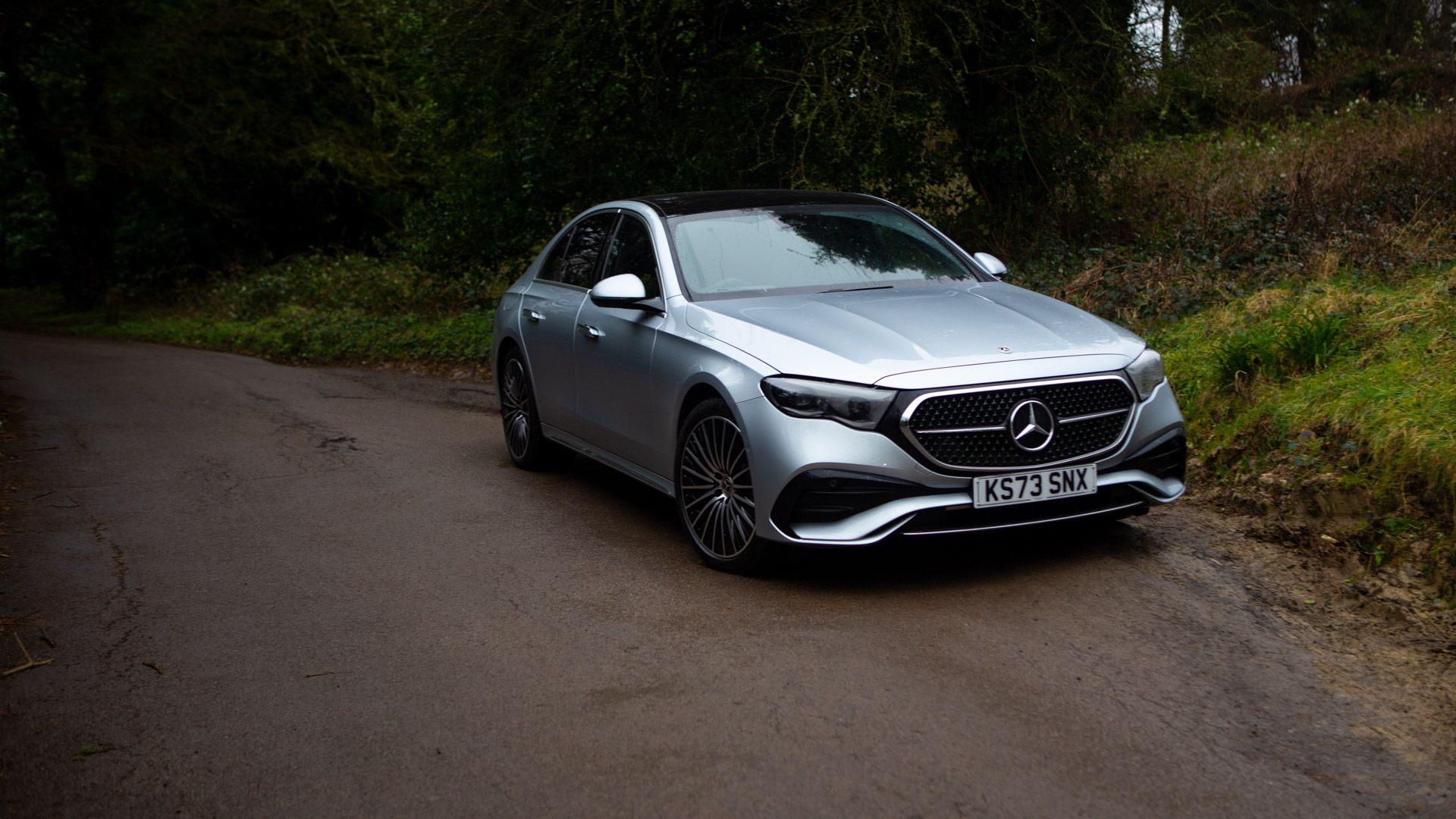
(Image credit: Future)
How much does the Mercedes-Benz E-Class cost?
Buying a new Mercedes-Benz E-Class can cost less than you might imagine. The range starts from £55,290 for the E 200 AMG Line model, which is considerably cheaper than most premium electric cars these days. Of course, if you want the most powerful model, the E450d 4MATIC you will be paying upwards of £80,640 and up to £89,410 fully loaded with extras. US models differ in spec, with prices starting from $56,750.
The PHEV Mercedes-Benz E300 e sits fairly mid-table in the range, starting from £68,020 for the AMG Line Advanced model. It also comes in the AMG Line Premium and AMG Line Premium Plus versions. The model I tested was the E300 e AMG Line Premium Plus, which starts from £76,585 and adds the 20-inch AMG multi-spoke alloys and the Superscreen.
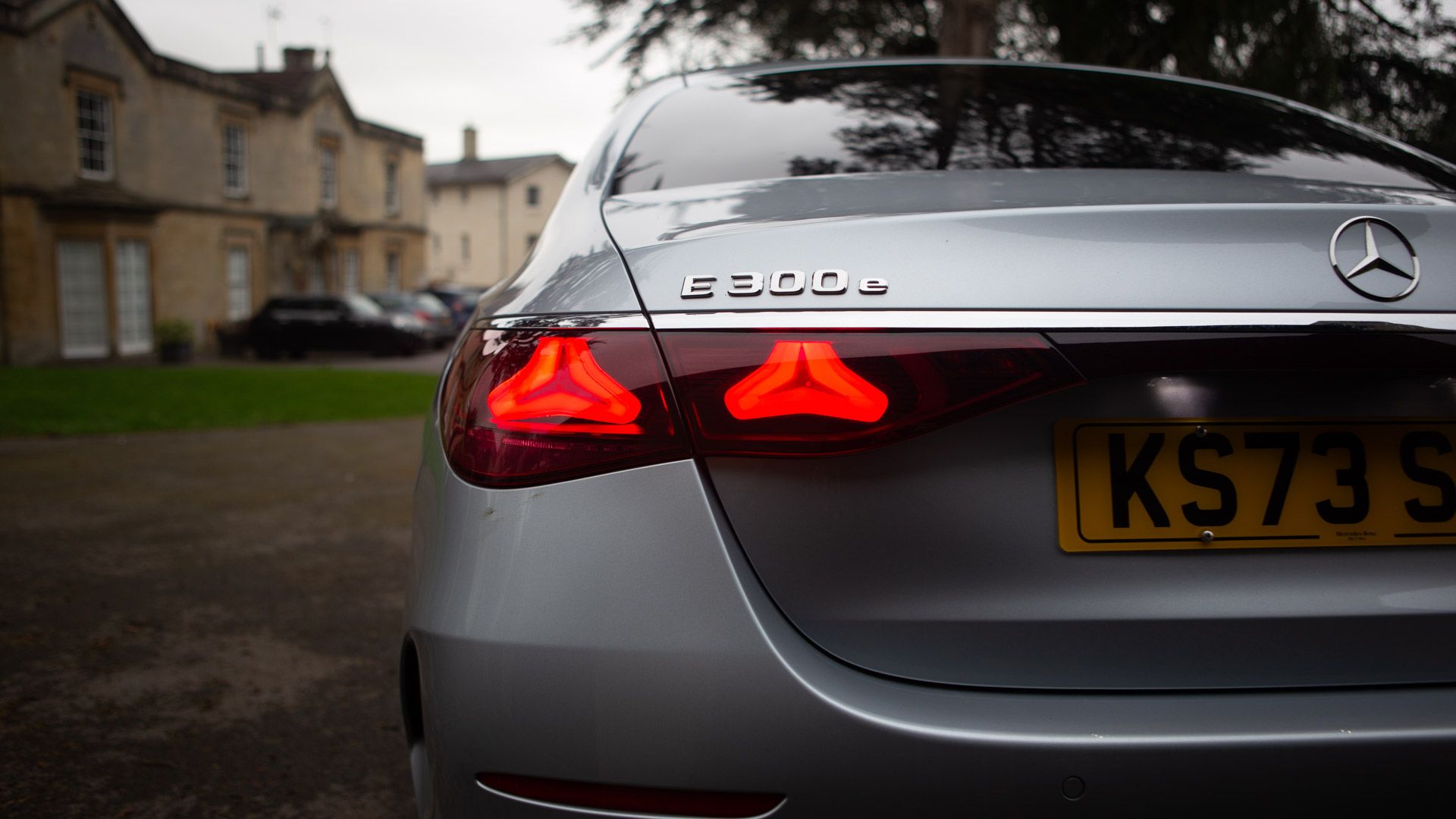
(Image credit: Future)
What's new on the Mercedes-Benz E-Class?
Described as following the classic three-box saloon design, the new E-Class looks every bit the classic design but with a few modern touches. At nearly 5 metres long, it’s a pretty big car, with lots of space inside, including 370 litres of boot space. The grill is deeper with small three-pointed stars embedded in it, while a gloss black insert joins it to the headlights to create the face. This feels much closer to electric models, such as the EQE and EQS saloon.
Door handles are now flush with the car, only revealing themselves when the vehicle is unlocked – again, something that has been done on the EQ models. The star logo is projected from the wing mirrors onto the ground at night when the car is unlocked, and at the rear, the LED lights use the star motif in the design, making this car really stand out.
Inside, the biggest change is the dash, which gets the option of a Superscreen. Like the Hyperscreen in the EQ models, this incorporates a passenger display screen and the central display behind a single glass panel that extends across the dash. Unlike the Hyperscreen, the driver’s display remains a separate unit, like a horizontal iPad[3] behind the wheel.
The cabin includes a fair amount of ambient lighting that surrounds the dash and accents the trims. This can be customised with any colour you wish and can react to different functions in the car, from music to driving alerts. This complements the choice of leather for the seats, either black, tonka brown or macchiato beige.
The centre console is very clean, with the wireless charging tray, cup holders and USB-C ports hidden away under a sliding cover. Then you have a larger storage area behind it, which opens in two halves to reveal more charging ports and hidy spaces.
As the norm across all recent MBUX models, the steering wheel provides a wealth of controls. This includes your media, volume and centre screen controls on one side, and then your info and head-up display controls, plus adaptive cruise control and speed limiter on the other.
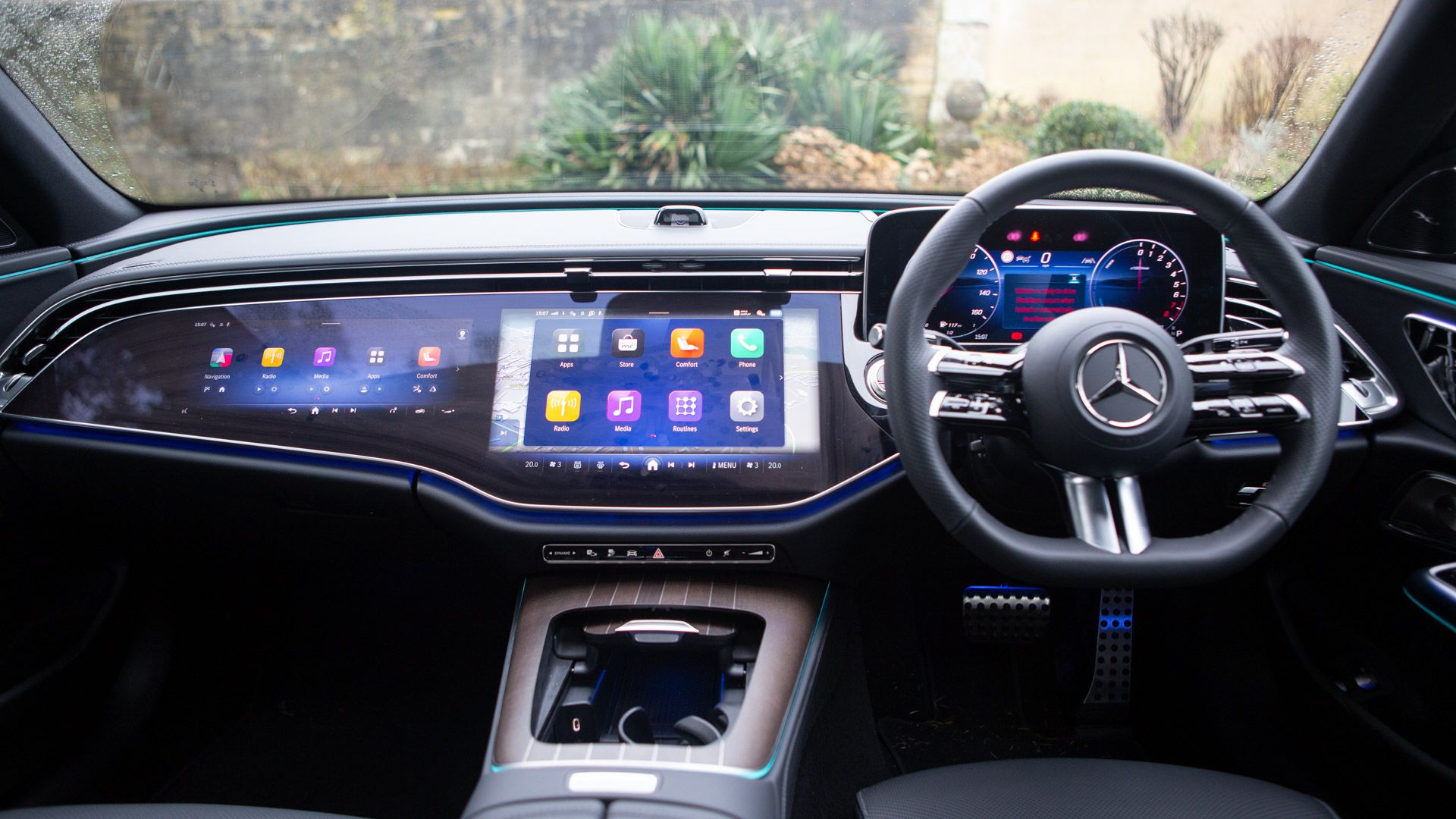
(Image credit: Future)
E-Class Technology
There’s certainly no shortage of tech on the new E-Class and the addition of the Superscreen makes that abundantly clear. This is running the very latest version of the Mercedes MBUX – the last version before it switches to the MBOS system. This is a highly competent system that looks great and is extremely easy to use.
The Mercedes MBUX voice assistant is a very easy way to access features too, and responds competently to the “Hey Mercedes” command. It can change the temperature, open the panoramic sunroof or even control the smart lights in your room, thanks to the smart integration. There’s also an option to allow it to answer questions without this pre-empt, which is also effective – though not if you’re having a conversation with someone else in the car.
The navigation plays a huge part of this system and can be displayed on the centre screen, the driver’s screen and the head-up display. You can even access navigation separately on the passenger display screen and search for different places – so your passenger can look up points of interest or places to stop and eat without interrupting your route guidance.
You can of course link your phone and use Android[4] Auto or Apple[5] CarPlay[6], though you won't get quite as full an experience using Google Maps[7] or Apple Maps. This is one of the few systems that I now stick with the manufacturer’s navigation. You also don’t need to use your phone to stream your music. The MBUX allows you to sign in to Apple Music, Prime Music, Spotify or Tidal directly to play from your library and stream via the car’s data connection.
Another benefit of signing in to your streaming platform rather than relying on your phone, is that it allows for full Dolby Atmos sound to be played through the stunning Bermester sound system. The system even includes 4D sound, in the form of a deep bass through the seats that vibrates like standing next to a massive speaker at a gig.
There are a range of other apps available in the MBUX, including some games which range from shuffleboard and sudoku through to Angry Birds. There are also productivity apps such as Webex and Zoom, allowing you to take video calls (in the passenger seat or while stationary) using the built-in cameras in the Superdisplay, and the Vivaldi browser which you can use to browse the internet or access streaming sites like Disney[8]+ and Netflix[9] for watching movies.
Also on the tech side is the E-Class’ driving assistance features. The Driving Assistance Package Plus, which is a £1695 option on all models, adds features such as active steering assist, automatic speed control and active lane change assist, bringing this up to a Level 2 autonomous drive. This is an excellent system, though the model I tested didn’t have it included, so I can only comment on the more basic adaptive cruise control, which I would never want to be without on a journey these days.
As is now regulation on all UK cars, the driving assistance system will give an audible beep when exceeding the speed limit. However, there is now a handy quick button on the top of the screen to turn this function off for the rest of the drive.
Probably my favourite safety feature in this car though is the new parking camera options. The exterior cameras give a full 360-degree view of the car, allowing for a handy birds-eye view on the display, which makes parking and narrow entrances a breeze. Now though, you can select a three-quarter rear view from the camera options and then drag to rotate the car on the screen. This means you can focus on any possible obstructions while parking.
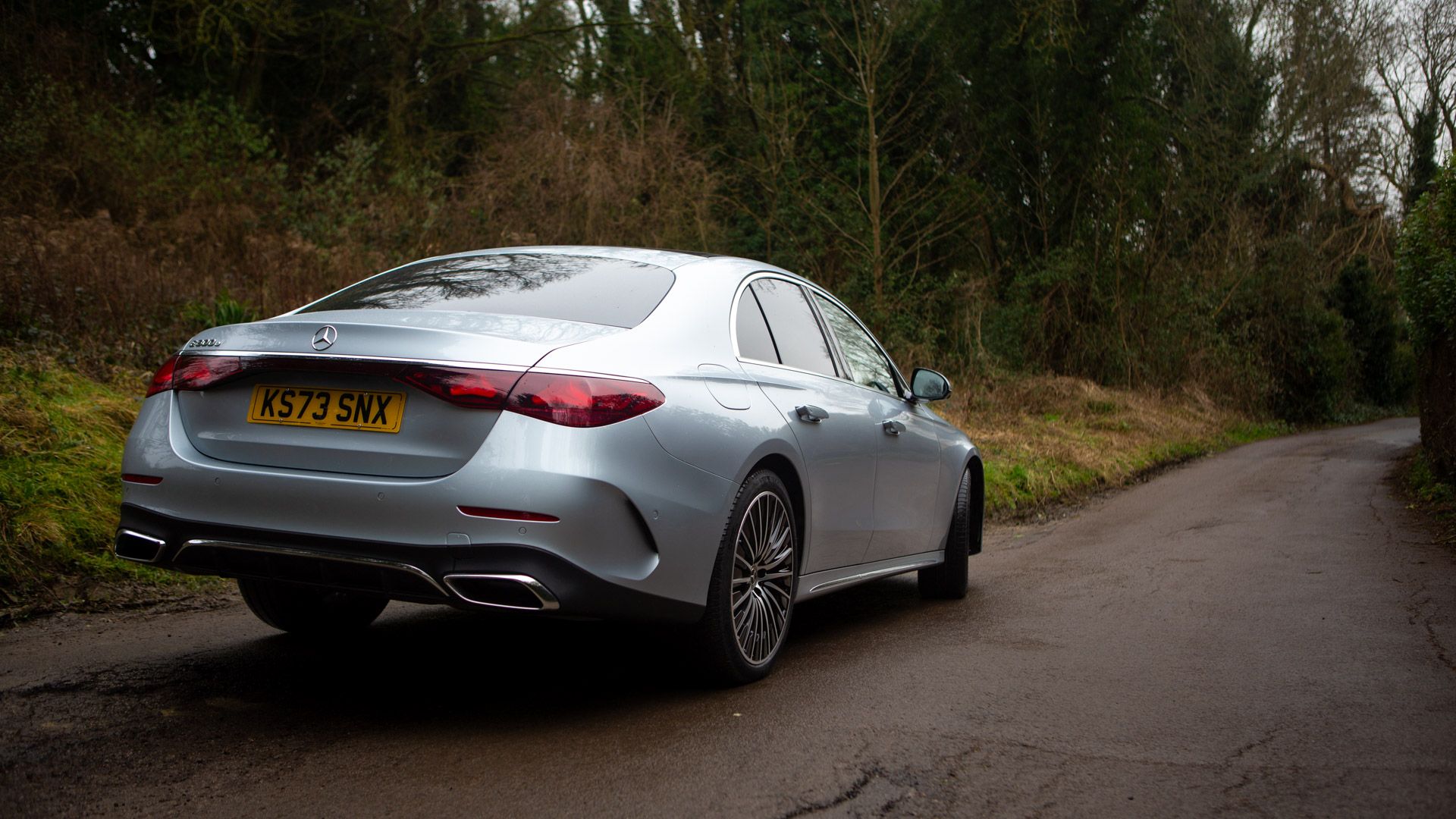
(Image credit: Future)
How does it drive?
Driving the E-Class is pure bliss. The car feels quiet, smooth, and has plenty of power when you need it. The E300e AMG Line Premium Plus has 313hp, delivered as a combination of the 4–cylinder 2.0-litre engine and the 95kW battery, which gives a 6.4-second acceleration (0-62mph) and 147mph top speed. There’s also a more powerful E450d model which gives you 390hp and a 4.8 second acceleration from the 3.0-litre diesel engine.
Part of the reason the E300e feels so quiet is that, as default, it’s making use of that battery for low speeds and only switching over to the petrol engine when you need it. So, pulling away is virtually silent. It’s only when you switch to the Battery Hold mode (designed to save that battery power) that you hear the engine, and it’s not the deep pleasant growl of a V8.
What I love about the size of the battery on this hybrid model, is that it will offer up to 70 miles of range on electric-only power, and even in hybrid mode and slower city speeds, it will be mostly using that battery, so that the petrol tank stays largely unused. The system is also smart so that when you enter London’s ULEZ zone or other congestion zones, it will switch the car over to electric power automatically.
There is a downside though, and it’s that because it’s using the battery power for regular driving, it’s often already a little depleted by the time you need battery-only. By the time I drove to London, I only had 40 miles of battery range left for the ULEZ zone, and by the time I left the next day, I had exhausted the battery power.
I did find that even when switching to the Battery hold mode, it was hard to recoup any of that battery range. It does this through the regenerative braking system but after a considerable drive, I have only added a couple of miles of range back to the battery.
Of course, the beauty of a Plug-in hybrid is that you can quickly recharge the battery, and the E-Class can be charged at home with an AC charger at up to 11kW. Unfortunately, the UK version doesn’t feature DC charging, so you can’t recharge using a fast charger – and in most cases, the CCS connection wouldn’t fit anyway. That does mean that you can’t easily top up the battery on the move, which is a shame.
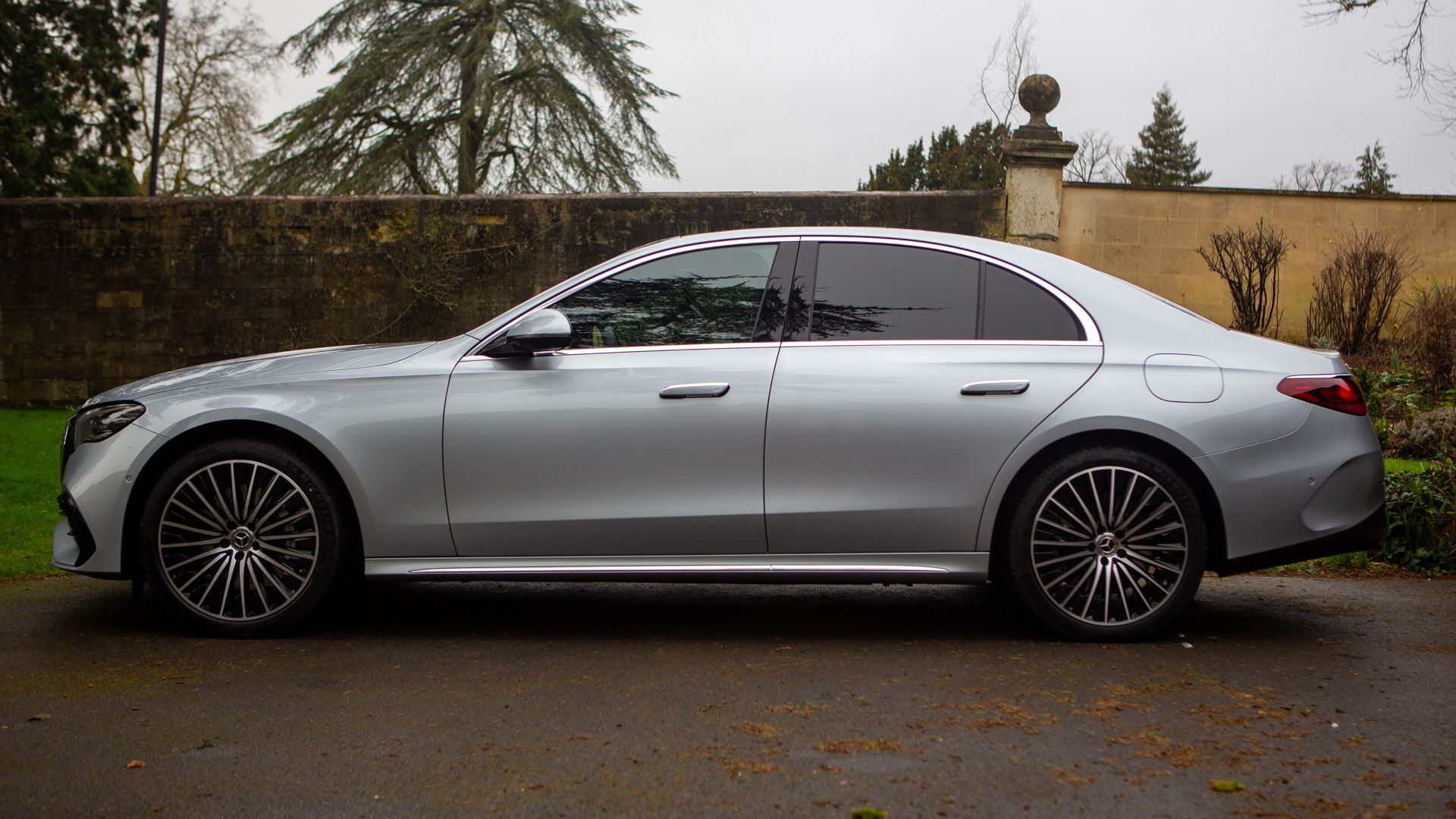
(Image credit: Future)
Should I buy a Mercedes Benz E-Class?
The E-Class retains its status as the ultimate luxury saloon and brings it bang up to date with some of the latest tech inside. It’s a better-looking car than the Mercedes EQE and in its Hybrid form of the E300e, it could be a more appealing option for many buyers.
Until the electric charging infrastructure catches up with the pace of electric cars, having an option where you can do up to 70 miles on electric-only power for short runs and an efficient petrol engine for longer journeys – or a combination of both for performance – is the sensible choice.
I suspect it won’t be long before we see an all-electric E-Class, but in the meantime, the hybrid is certainly the one to go for. Whichever model you choose though, the new Mercedes E-Class is everything I hoped it would be. A class-leading vehicle both in terms of comfort and technology.
CATEGORIES